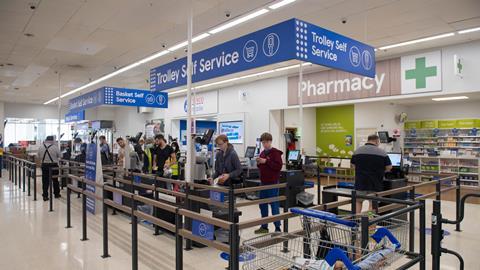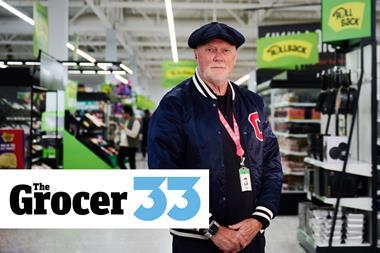Supermarkets bend over backwards to serve customers wherever and however they want to shop – be it via new convenience formats in residential areas, ‘just walk out’ stores, the ultra rapid grocers.or by autonomous robot and driverless car.
Every which way except, it seems, the old-fashioned way – in a store at a manned checkout. And customer service levels are suffering as a result.
According to the Grocer 33 annual mystery shopping survey, which reached its conclusion at the Grocer Gold Awards this week, average customer service scores fell by an average 1.2ppts over the past 12 months to a new record low. And staffed checkouts are the main culprit for the decline.
The checkout staff themselves aren’t the problem. On multiple measures – including friendliness, their care in handling goods and help in packing bags – the level of service remained unchanged from the year before.
And kudos to them. “Life is tough, customers are getting impatient, everyone’s more flustered, everyone’s dropped the politeness of the pandemic,” says PwC senior retail adviser Kien Tan. “Grumpiness among the general population is up! Checkout operators are certainly having a less great time of it.”
The chief bugbear of our legion of mystery shoppers was the length of time it took queueing to actually reach the till. A metric which is soaring.
The modal average across all supermarkets for time spent queueing last year was… no time at all. This year, it was a three-minute wait.
Most major supermarkets have been shifting towards self-service checkouts. And why not?
It certainly provides a better bottom line, with significant savings on labour costs for the retailers. Indeed, evidence suggests the shift to save on labour may have gone too far, with the majority of supermarket staff who have to manage self-checkouts saying they ‘cannot cope’ with the number of machines they oversee, found a major study of more than 6,000 workers last year.
And undoubtedly for many customers, not having to make chit-chat or eye contact or queue is no bad thing. An industry source revealed to The Grocer around 80% of sales in a typical supermarket now go through SCOs. As Tesco CEO Ken Murphy told shareholders last week: “We genuinely believe, at the end of the day, it provides a better customer experience.”
Clearly, though, not for everyone. What about the fifth of sales that don’t go through self-service? Is it a better experience for those shoppers?
Supermarkets are hell-bent on meeting the needs of shoppers who want food quickly or within just a few clicks. Even when it doesn’t make complete economic sense to fulfil that need. And their obsession with offering competitive pricing amid the cost of living crisis is crystal clear.
But there is a sizeable – and vocal – cohort of customers who simply prefer another human in the loop. Regardless of the business case for abolishing staffed checkouts, those customers shouldn’t be left wanting, or waiting.




















No comments yet